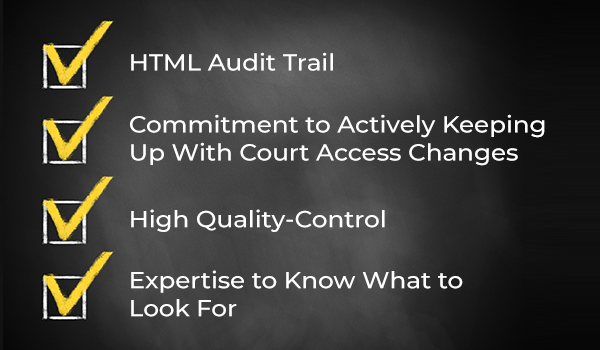Automated criminal background check technology has been growing in prominence over the last several years. As more and more vendors add automated court research to their services, companies that sell background checks must find ways to tell these vendors apart and choose the automation product that best suits their needs — and the needs of their clients.
Are all automation solutions essentially the same? What does “good” automation look like in the background screening industry?
In this article, we’ll help you understand the differences between automated background check providers.
You’ll learn that not only are all automation vendors not created equal, but that choosing the right provider can save your company money, increase your efficiency, reduce your risk, and boost your profits.
Why choose automation, and when?
Before we get into the qualities of the how to best automate background checks, let’s briefly explain how automation works and how it can benefit you as a background screening company.
Automated background screening tools “scrape” court websites for arrest and conviction records, essentially replacing the work of human researchers with automated agents.
The advantage of automation is that it takes error-prone and inefficient humans out of the equation as much as possible. Not only do you not need paid researchers to enter data or conduct record searches, but once results are reported, no humans are required to determine whether the information is reportable. Automated background check providers can program communication standards based on what you, the client, have asked for.
For example, if you’re not interested in misdemeanors or want to limit the number of years on your search, the software can automatically filter those records out.
The result is a more efficient, cost-effective, and reliable background check process. With automation, you can reserve your human researchers for the more difficult jobs where court data is not easily accessible online.
Automated background screening methods compare favorably to database searches, as well. Databases can get stale quickly. When you order a check from a reputable automated researcher, you can be sure the information will be freshly searched on a public access website.
Now when should you choose automation? Only when it meets the same quality standards you have for manual research.
4 unique elements of the highest-quality automated background screening solutions
You can choose to build your own automated background check platform, but that option invites some challenges. Namely, you’ll have to develop the platform yourself, build a robot for each jurisdiction and pay the costs of maintaining both the platform and robots on an ongoing basis.
If you decide instead to go the more flexible route of partnering with a vendor, make sure your vendor has these four characteristics:
1. An HTML audit trail
Both employers and background screening companies need to be able to document their information sources. This provides a backup layer of protection against lawsuits and regulatory challenges.
The best background screening platforms will provide this documentation in the form of HTML snapshots that offer, for each search, a step-by-step glimpse of what was reported by the court.
Should you encounter any questions about what you found when you searched the court or how you found it, these snapshots will provide ironclad assurance that you only reported that which was reported to you.
2. A commitment to actively keeping up with court access changes
Courts are constantly changing things, from the format of their feeds sites, to the technologies they use, to the way they present information.
Automated background check tools can’t be installed with a set-it-and-forget-it attitude. Human experts should be continually monitoring the feeds to ensure they’re relevant and to adapt the robot to any changes. (This is another reason why homegrown systems are difficult and costly to maintain.)
3. High quality-control standards
Court feeds frequently go down for maintenance or other reasons. When that happens, an automated background check tool might return all clears. And if your vendor doesn’t know what to look for, that could expose you to a significant level of risk.
Employers are not usually happy when you inform them you inadvertently missed hundreds of disqualifying records — especially if they already hired some of the candidates. They could be subject to penalties, and your company could be subject to lawsuits and lost revenue.
A high-quality background screening automation vendor will have a rigorous quality-control program in place that continually monitors its reports for errors. The vendor will have the experience to recognize the difference between clear results and incomplete searches.
4. The expertise to know what to look for
An automation solution is only as good as the people who programmed it. If the developers don’t know the ins and outs of the criminal background screening industry, the software may end up missing cases. Both underreporting and over reporting can occur.
For example, does your automation vendor know:
- Different courts have different feeds? They may be tying into the wrong feed for the information you require.
- Courts sometimes split records? For example, misdemeanors and felony charges may be kept separate.
The best automated court research providers have deep experience in the industry. Over the years, they will have developed the expertise to know the data they’re getting and the data their systems cannot access. In the latter case, a high-quality vendor will supplement their automated processes with manual research to ensure their clients receive the fullest criminal background picture possible.
At InformData, we run every court website through an exhaustive quality check, comparing each source against the largest historical information database in the business. To learn more about our quality standards and the capabilities of our industry-leading automated background check solution, contact us today.

